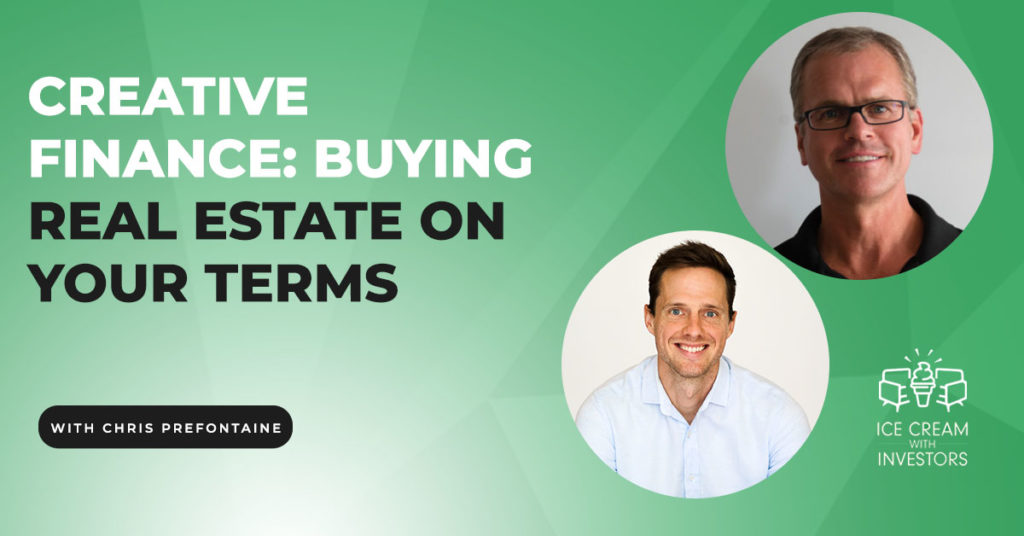In today’s economy, many people find it difficult to purchase a home outright. As hundreds of thousands of people leave corporate America to start their dream businesses, traditional financing methods like banks give them a hard time accessing loans to buy properties. Having been through several real estate cycles, Chris Prefontaine understands the challenges of these businesses and helps students navigate the constantly changing real estate waters. Chris is a three-time best-selling author of Real Estate on Your Terms, The New Rules of Real Estate Investing, and Moneeka Sawyer’s Real Estate Investing for Women. He’s also the Founder and CEO of Smart Real Estate Coach and host of the Smart Real Estate Coach Podcast. Today, Chris shares some of his best strategies for navigating the ever-changing real estate market, particularly on creative finance.
Free giveaway:
Master’s Class: www.smartrealestatecoach.com/mastersclass
Strategy Call: www.smartrealestatecoach.com/action
Book Request: https://wickedsmartbooks.com/icecream
Social media links:
Website: http://www.smartrealestatecoach.com/
Podcast: https://www.smartrealestatecoach.com/podcast
Facebook Page: https://www.facebook.com/smartrealestatecoach
Google +: https://plus.google.com/+Smartrealestatecoachchannel
YouTube: https://www.youtube.com/smartrealestatecoach
Instagram: https://www.instagram.com/smartrealestatecoach/
LinkedIn: https://www.linkedin.com/in/chrisprefontaine
Twitter: https://twitter.com/smartrecoach
Life Force: How New Breakthroughs in Precision Medicine Can Transform the Quality of Your Life & Those You Love https://www.amazon.com/Life-Force-Breakthroughs-Precision-Transform/dp/198212170X
—
Watch the episode here
Listen to the podcast here
Creative Finance: Buying Real Estate On Your Terms With Chris Prefontaine
I’m super excited to have Chris Prefontaine on the show. Chris is a three-time bestselling author, Cofounder of the Smart Real Estate Coach, and host of the Smart Real Estate Coach Podcast. He has been in the business for many years, starting in construction and owning a realty executive franchise. He’s running his commercial and residential investments across North America. During the 2008 crash, Chris reorganized and reenergized his entire business to weather all storms. This is a topic I’m excited to have and talk about as we enter the late half of 2022 here. Chris, welcome to the show.
Thanks, Matt. I appreciate it. I’m looking forward to diving in. Hopefully, as we chat, we will share some nuggets.
We like to start with a difficult question here. What’s your favorite ice cream?
I should have known you were going to do that. I don’t eat ice cream anymore but I can tell you emphatically what my favorite was. It was coffee.
You’re the second person to say that. I love a good coffee ice cream. Do you have any favorites up in the Boston area there?
No. I haven’t in years. I’ve been good, but in my younger years, when it didn’t matter, I would always have coffee. It has been a while, so I couldn’t direct you.
Tell our readers what’s the scoop. What do you do now?
This is interesting because every year is different. I run the property still with my son and son-in-law, meaning we have our properties. We buy and sell every week as we teach. It’s super important to keep our finger on the pulse. I’m never bored because creative financing might look the same but always different. I do that. I am more of a CEO role now for the Smart Real Estate Coach but I coach the high high-end students still. I love doing deals and helping them. When I say higher end, we have levels of involvement. The ones that are the most serious and committed I work with personally.
Before we get into buying real estate on your terms, take us back. Where did your real estate journey begin?
I won’t go too far back. My dad owned a business that I grew up in, but it wasn’t real estate. It was welding supplies and industrial gases. He was the largest in New England but the connection to real estate is twofold. One, he would build his buildings brick and mortar. As a little kid, I remember him telling me that he would lease them back to himself. I’m thinking, “You’re the company.” I didn’t get it. Now, I get it.
He very carefully did those buildings and leased them through his company. He would hang out with people that on the side of their businesses, flip land, develop land, and different avenues of real estate. That got me exposed. Not to be political because in the ‘80s, Trump wasn’t a name but I read his book, The Art of the Deal. I was intrigued from the ‘80s until I started officially in ‘91.

Creative Finance: Free and clear properties make up a third of the properties in the United States. That’s an enormous number, and they’re usually not on the market.
Did he own real estate as well beyond leasing it back to himself? Did he do any of the developmental lands?
He would hire a GC to do it. Like the old school things that I do now, he would find a piece of raw land across from this building. Across the pond, he found a piece of raw land, knocked on the door, tied up the land, and then engineered it. Once it got all engineered for subdivision, he would sell to build it because he didn’t want to do a lot of that stuff. I’ve done that over the years too. He was always doing different things and intrigued by them.
Do you remember your first deal?
My first deal was with a partner. It was the son of someone I met through him. It was on a golf course. It was a split-level home that could be subdivided. That was what I was comfortable with because I saw him do it. I subdivided the land and built a duplex on the new lot. On the side of it were condos. We kept the house for about 4 or 5 years. The current renter staying in there, we sold that off. That was a shitty time. The house probably made much money, but the subdividing, the building, and all that made the deal worth it. We also logged the lot. Someone came and paid us cash to take certain wood out of there. That was cool.
I was out in Oregon. There’s a huge timber business out there but I don’t know anything about that. Was it a pretty big lot? Was it a couple of rare pieces of wood that they wanted?
It was not a huge lot but it was an acre or two. There was enough hardwood or what type they liked. They’re the bigger trees. They have to file a plan with the town, carefully take out that, and preserve that. It was good. If I remember, I was young. My kids were just being born. Maybe we got $1,400, $1,500, or $2,000 in cash to me. I was like, “That’s a windfall. I didn’t know I was going to get that out of the woods.” It was fine.
Let’s transition into creative finance because you’re the master of buying on your terms and all the different ways that you can structure financing deals or the terms of a deal. First of all, can you help our readers understand what creative financing is.
When we say terms, that’s all we mean. To your point, creative financing for us means no banks and no signing personal loans. I learned that the hard way after the ‘08 crash. It means no borrowing from investors. I know some readers may be okay with that. They call it syndication. They go out and raise money. I don’t want to go to sleep at night knowing I’ve got money out there like that. I don’t do that anymore. The terms to us mean lease purchase. That’s one way we buy.
Another way is owner financing where the owner is the bank. There’s no loan involved with a real or conventional bank. The third is subject to existing finance. They call it sub-to. That means I buy your home. You’re on the loan. You need debt relief and you want to beat it over. Owner financing is usually free and clear. There’s no mortgage. You’re very well off financially. Sub-to is the complete opposite, “I need help. Please take my home.” They’re completely opposite conversations.
Let’s break each one of those down. There’s owner finance and sale of finance. I ran this strategy a lot when I was looking in a tertiary market near where I live in Nashville. What I found is that in the ‘80s, they built a street of duplexes. One person owned them all free and clear. I figured that those people would later in their careers still want the annuity payments and some cashflow but wants to get rid of the responsibility. Where do you see that play out in your market? How do you even approach a seller to have that conversation?
There are two different ways. The other one is lucrative. I’m glad you started it. It’s owner financing. I’ll give you metrics. There are two different ways. One, we have virtual assistants calling expired listings, for-sale-by-owner listings, and for-rent-by-owner listings. In doing that, we, on occasion or on accident, run into a seller who is free and clear. That’s the luck of the draw.
Once you learn creative finance or how to structure deals around creative terms of a deal, you can’t see the world the same way again.CLICK TO TWEET
If a student or, in our case, we do want more leads than those will provide, we will buy lists. You can do it online with the program we have. They’re free and clear properties. For a little context for everybody, free and clear properties make up about 1/3 of the properties in the United States. That’s an enormous number. This is fun because they’re usually not in the market. They usually don’t need the money right away.
Therefore, they usually are great candidates for giving you the term you want in years. My office building right down the street from here five minutes was bought with owner financing. It’s a mixed-use building. I have other tenants in there. I don’t know if you’ve ever been through a commercial loan process for the readers I’m talking to but it’s grueling. I didn’t have to do that.
I sat in what is my office and spoke to the gentleman who was about 70. He’s the largest land owner in the area. He’s not new to real estate. We structured an owner financing deal for the twentieth. That’s pretty cool. We did it in minutes. I didn’t have to go through the underwriting that the bank causes so much stress over. It’s insane what they put people through.
Part of my story is I was tired of going to those banks and getting those loans. I hit my ten Fannie and Freddie limit. I started looking into creative finance because 1) I love this idea of structuring a deal and creating different terms to make it beneficial for everybody, and 2) I was tired of sending gigabytes of data to get a freaking loan approved or denied by some checkbox.
I very rarely will do it unless it’s for personal residence. When I went through one for my personal residence, where I’m sitting talking to you was a little cottage. I tore it down and then built this house mostly with cash. When I bought the first house, my wife said to me, “What do other people do who are not in real estate?” I was stressed. I know what the hell I’m doing with it. I knew how to work the credit and everything. I don’t think anyone should ever go through that pain. It’s not worth it.
When you’re looking at seller finance, are you looking strictly for commercial or residential? Are you looking for strictly paid-off and using that as a lead?
Usually, I teach and do most of the single-families. That’s because I don’t want to teach all the different shiny objects that you can buy creatively. You and I know you can buy boats, planes, and cars with owner financing. It’s done every day. The wealthiest people are the savviest. It’s what they do. They hate banks. That was a very broad statement. I don’t need to step on toes but single-family is what we teach. The students, mainly the ones that work with me, get a little bit more advanced.
On a coaching call, one of my coaches said, “Can you help me move from this basic model where I create three paydays every day and do single-families? Can you show me how to do a few multis, keep them, and still do them on terms without banks?” I sent him my whole campaign and everything. There are more advanced techniques but by and large, we stay with single-families as a base model.
I’ve heard you say that you structure these as principle-only payments for the seller in most situations versus giving principal and interest. How does that work? Talk us through that.
I’ll tell you a hybrid way that I had in my building. Most single-families we structure as principal-only. Let’s say the house is $500,000. I’m going to figure out what a buyer would perceive a mortgage payment to be on that. Let’s say a buyer would perceive that to be 6% or $2,700. I’m making that up. I would go to the owner and say, “My buyer is going to have that mindset. That’s who I deal with. It’s buyers who need time. I need to be somewhere around $2,000 or whatever spread I want to create.”
I’m going to offer the owner probably $2,000 or a little less than that. It’s probably $1,700. It’s going to be principal-only. Towards that $500,000, I’m going to pay them $1700 a month principal-only. When we exit, I’m going to collect that plus. That’s how we structure most around financing deals. I brought that to the owner of my building. He’s in conventional real estate. He owns a lot of lands. He said to me, “I want 5.5% interest.” That’s when rates were low too.

Creative Finance: Every industry has the idiots that run around like the wild west, and then we get in trouble for it.
Long story short, I structured it so we both win. It has to be a win-win or it’s going to be an ugly deal. I structured where for about eighteen months, I did principal-only payments. I hammered down my $550,000 purchase price. I got that balance down to about $490,000 to $480,000. At that point, when we amortized the balance, I gave him a 5.2% interest. In hindsight, it was a super good idea because commercial rates are even higher than residential now. I’ve got a good situation.
I thought you were going to take that down the path of saying that when you make money on interest, you have to pay income tax versus principal. It can be written off as capital gains and things like that. Is that why you do that? Is it because the amortization and doing the math get a little funky?
It’s not the math. The math does but I don’t care about it. Every owner is different. This guy was dead-set on a paycheck for his wife and son. Maybe he knew something was up because he has since passed. In 2021, he passed away sadly. His wife is getting a nice check. She asked me to say, “Could you please not pay it off?” Some of these people don’t want to be paid out. They do it for plenty of reasons. My selling point sometimes might be, “Take the time to report that small interest income. We’re going to pay you principal-only. We’re going to up the price but it doesn’t always fly.” He was savvy enough to say, “I want my interest because it’s a good amount.” 5.5% is still a good amount on that money.
I don’t want to breeze over the other two points. There’s subject to and leaseback. Let’s start with subject to because this is a super interesting strategy as we go into what looks like choppy waters in 2023. First of all, can you define what subject to is for our readers?
You’re spot on. I’ll tell you why. It’s an amazing opportunity. Subject to means completely different from that owner financing deal. They’re set up well. They want to create a neat deal. I’ll give you an example to define it. A couple is getting divorced down Cape Cod in a resort area near us. They have a loan in place, and they need out. They’re fighting. They have skipped the last two mortgage payments. They want out or they let the bank foreclose on it. It screws up their credit and their life for two years.
We bought the property immediately and caught up a raise. It was $4,100. It was not a big deal. When I say we bought it, subject to means their loan stayed in place. It means it’s subject to that existing loan. If anyone has ever bought a home, they get a settlement statement. If your bank loans you money, that new money or loan shows up on the settlement statement. It’s the bank’s money you put in.
On ours, it says, “Subject to an existing loan with the bank name and the amount due.” In that case, we didn’t give them anything on top of that. We bought that house. The loan is now and will forever stay in the seller’s name, both of the guarantors, the wife and the husband who wanted debt relief. That’s what subject to is. It’s an amazing opportunity. I’m screaming from the rooftops as the media stupidly is telling people it’s a bad time. It’s the best time to be in real estate.
We’re acquiring loans. I did a deal in New Jersey with a student, Morris. He provided me with this deal. The underlying loan is 3.1%. We’re going to take that loan off. It’s $267,000. The house is worth $350,000. She needs debt relief. From COVID, you have this amazing runoff for nine years up to COVID. People have all this equity. Sadly, they’re going to lose it. Instead of us trying to steal it or mock their credit up, we’re saving their credit by taking that over. The banks want to foreclose on them and screw them up for two years. We’re buying a house at a 3.1% interest that we don’t have to sign personally on and that we’re going to have for 20 to 30 years if we choose to. That’s pretty amazing.
You’re locking in that interest rate. I’m in the middle of trying to buy a personal house as well. It’s terrible timing to do so but one of the things I’m looking for is where can I go find people with mortgages at 2.5% or 3% and do a subject to where I can assume that loan. The bad part about it that you hear on the internet is this thing called a due-on-sale clause. Can you help educate our readers on what the due-on-sale clause is and why we shouldn’t care about that?
There are a couple of things. Due-on-sale means that when the property is transferred, the bank can contractually call that note due. I’m not an attorney or an accountant. I’m telling you about my experience. I always sit down on the shows. My experience has been for 31 years and about 18 in doing these that I make the payments on time like I promised as you would for any other bank. The bank is not in the business of taking property. They just want to get paid. I have had local banks that send us the note. They know where we are.
Keep them paid. That’s number one. Number two, the Garn-St. Germain Act of 1982 was set up so that people could transfer property internally in a family trust safe, for example, and not trigger a due-on-sale. We titled all the properties. This is just our choice. I’m not an attorney giving you advice. Our choice is to title the property. If 123 Jump Street was the property, a family trust is the last thing you would usually use. I’m not saying that’s a failsafe. I’m saying that’s how we choose to do it. It provides another layer of anonymity. We do that in a land trust.
There’s one constant in real estate, and that is it constantly changes.CLICK TO TWEET
That’s the sub-to issue and what I feel about the clause. Our senior attorney at a local firm that’s very reputable had to sit down with the junior attorney who now is an amazing attorney with us. This is back in ‘14 because he said, “I can’t do those.” The senior attorney was very conservative. He said to him, “It is not a legal issue. It is a contractual issue.” We structured paperwork so that the seller signs and agrees to everything that they know they’re exposed to. We have never had an issue. That’s a long answer.
I haven’t had as much experience as you have but I’ve never seen a bank go on the due-on-sale clause. When I was educating somebody about this, they were like, “Interest rates have gone up.” I’m like, “You’ve got to think from the bank’s point of view. They can get a consistent payment or they can do the due-on-sale clause. You might have to refinance. All of a sudden, they get the cash but they don’t have a consistent payment.” The banks are in the money of getting consistent payments, in my opinion.
It’s the bank. It’s not you. The banks foreclosed. There is a legal process they have to follow. It’s not cheap. The attorneys love milking that. Let’s say it cost the bank $20,000 or $30,000. Why would they do that? They wouldn’t. They’re not going to make that up for years. It sounds good in theory that the interest rates are higher but that money is in use. What are they going to do? Take it back and sit on it. They’ve got to loan it out but it costs $20,000 or $30,000.
The last one was the leaseback strategy. Can you tell our readers a little bit about that strategy?
It’s at least purchased. I would type the same home up. Presumably, there would be debt on it. I’m going to tie the $500,000 on the home up. I’ll keep it simple. Let’s say there’s a loan of $300,000. The owner doesn’t want to take less than five markets. They’re not giving it to him or her. I say, “Mr. and Mrs. Seller, here’s how it’s going to work. I’m going to buy your home at the end of the term for the remaining balance, and then I’m going to guarantee you $200,000.” It’s $300,000 now. It was lower then, so I benefited.
You lock it into your equity that the market is not giving you perhaps but you have to wait for it. As the market is shifting, it’s a great strategy. You can’t do it in Texas. You can’t be in the middle of what we call a sandwich lease. You can’t do the lease purchases with a seller and then do a rent-to-own with a buyer. You can’t do that there. Everywhere else, you can. I prefer anyway the other two strategies we talked about. To our Texas students, I say, “You’ve got the two best I like. Do those.”
It’s crazy. Texas doesn’t have a ton of regulation but for this one little strategy, they do.
It’s because some idiot screwed it up. He has to go for us all. In Illinois, you need a license now to do what we call an AO deal or a wholesaling because someone took advantage of it and messed everybody else up. It’s normal. Every industry has the idiots that run around the Wild West. We get in trouble for it.
I’ve heard you talk about disposing of deals as a rent-to-own model. Do you find that you dispo a majority of your deals as a rent-to-own? Talk us through that a little bit.
I’ll give you the exception and then talk about the rule. The exception is the house I talked about down in Cape Cod that we bought sub-to. The woman that went in was going through law school and had some dings on her credit but she has since come out. She’s a lawyer. We said to her on day one, “If you can stay current and you can get your deposit up to 20% instead of rent-to-own, you will never go to the bank. We will transfer this into an owner financing deal and keep doing the house.”
We’re going through that and selling the house, so we’re the bank. That’s not the norm. The norm is we put everybody in as a rent-to-own buyer. There’s a huge distinction here. You probably heard me talk about it but for everyone’s sake, there are publicly on YouTube and podcasts mentors and educators saying, “We do rent-to-own. We stick a buyer in the house. We don’t care if they’re going to cash out. We hope they don’t because we’ve got to collect another payment and do it again for another buyer.”

Creative Finance: What you provide for value is going to be how you develop your wealth, and you get a major opportunity.
That’s so awful morally and ethically. My son, Nick, handles our buyers. We make sure if a buyer is going in that home for rent-to-own, they are a true buyer that truly needed time to either fix their credit or get seasoning the bank because of time. It’s because they might have been self-employed. Think about how big this market is. You have hundreds of thousands of people or individuals leaving Corporate America to start their dream business. They go to a bank and the bank goes, “For your new business, I need two years of proof of income.” They come to us. That’s a true buyer.
They’ve got a down payment. They just can’t buy yet. The second thing is the rates went up in 120 days. I know because my daughter and son-in-law were looking for a home. They bought one. The rate went from low 3% to 6% while they were looking. You took hundreds of thousands of buyers, put them on the sideline, and said, “You can’t buy.” We have all these buyers to help. All we have to do is find properties. The sellers are failing it because they lost all the buyers. It’s a crazy opportunity.
When I started learning about rent-to-own, I was like, “Who would do this?” One of the best statements I heard out there is there are so many people that are unbankable for one reason or another. They’re an entrepreneur. They have bad credit for something. They have something on their report that doesn’t fit the bank’s box. This is an opportunity for someone to own a home. I don’t think that’s a terrible idea. If it works for them and it works for you, why not make it happen?
I can’t say how many buyers have tears in their eyes because they thought they were done. I can give you example after example. She owned a very successful salon. I won’t say what town to expose her to. It cashflowed well. She went through in vitro. They spent $100,000 on themselves in bankruptcy over this. They’re successfully getting that done but we ended up selling a home for them on terms and putting it into one of our homes on terms, “How can I go home?” They have since cashed out years ago. It’s good for them. They said, “I thought I would never buy a home.” Here’s the punchline. She became a student. She’s doing deals. Is that cool or what?
Earlier in the conversation, you mentioned this idea of three paydays. I want to get into that. Can you talk to us about what are the three paydays that you teach your students?
We trademark this federally. It’s pretty unique to us. When a buyer comes in that I talked about or they are a true buyer and they have a down payment, that’s payday one. It’s nonrefundable. It doesn’t go on escrow. You’re not a realtor. If you are, it’s a different conversation. That’s a great tool for you. Payday one is yours to keep. Payday two is the difference between what you’re paying on the underlying debt to the owner and what you’re collecting from the buyer.
That’s going to be somewhere around $300 to $1,000. You might luck out on occasion but that’s roughly the average. Payday three is awesome because payday three is all the principal paydown for the whole term that we have been talking about, plus your markup. All three paydays for Austin or our market totaled around $78,000. It went up a little bit. Our students range from a low of $45,000 to a high of $250,000 and up in the high-end areas like DC, California, and some areas of Florida.
It’s amazing. That’s why when we talk about people doing these deals, please understand that this is not overnight ever. I was in real estate for eighteen years before I started doing this. It took me a little time but if you’re brand new, there will be an on-ramp. It’s okay because then you own this skillset for life. If you do a couple of loans a year, you would be okay, or your home every five years. It’s a skillset that everybody should learn.
Once you learn creative finance or how to structure deals around creative terms of a deal, you can’t see the world the same way again because, with everything that I see out there, I’m like, “How can I structure that so it’s beneficial to them, but I’m out of pocket very little, and I get the benefit of whatever it is like boats, planes, cars, houses, etc.?”
You were looking for your place. I searched hard. I couldn’t get one on the street. I had to buy that cottage I talked about because it was near the water here. I tried all the time. I looked for a family that way. I tried to buy it on terms.
You’re a guy that has been in the real estate business for a long time. We’re in a weird spot where mortgage rates have doubled. Home prices are higher than they have ever been. New construction starts are down. It’s a weird time. Talk to us about how you’re viewing the market both as a residential owner and also as an investor.
In real estate, the times when you get caught speeding are because your timeline is too short.CLICK TO TWEET
To take off what we were saying earlier and expand on it further is an opportunity. The market is always going to change. That’s one thing for sure. I didn’t say this but it has been said. There’s one constant in real estate. It’s going to constantly change. What then do you do? Do you sit on the sidelines like so many people I hear? “I’m going to wait for it to come.”
You get good at structuring deals like Matt and I have been bantering back and forth about so that when it does change, when there is chaos, or when there is uncertainty, and all of that is going on with post-pandemic and everything else. When all that is happening, you go, “I can help a bunch of people and be the guide. As a result, I’ll get paid very well because I can help a lot of people.”
What you provide for value is going to be how you develop your wealth. You’ve got a major opportunity. The only tweak we’re doing is the students caught on well. We want to help them structure longer terms. We’re teaching them a little bit better scripts and comfort levels so we can get the norm being 5 years instead of the norm being 3 years. It’s a conversation change.
It’s happening all over the community, which is pretty cool. It’s how we used to teach it. We used to teach, “Always purchase, for example, 36 months.” Now, we’re teaching different ways of extending that and then owning these things for twenty years if you want. There’s a whole different advanced talk that we call Wealth Stacking. We’re in the midst of trademarking that too.
Why the longer term?
Like my building for twenty years, do you think I care? My building is locked in where it is. In twenty years, do you think I care what happens now, next year, in 3 years, and in 4 years? I don’t. I could care less. The market can do whatever it wants to do. If I get 10 to 20 years, I’m good. Let it do whatever it wants to do. You can always rent a place.
I typically find in real estate that the times when you get caught speeding are because your timeline is too short. Like the market, I believe in real estate. It’s always going to go up into the right as long as you hold it long enough. I can’t tell you how long that has to be. The longer you can expand your timeline, the better position you’re putting yourself in. If market conditions don’t change or if they’re not as choppy as you expected, you still have the option to get out of it, whether you want to sell it, dispo it, or do whatever you want with it.
There’s always a pivot. I have a new student I talked to, Kelly. Kelly owned several quite successful businesses with multiple 6 figures, if not 7 figures, before she met us. She’s coming to our community at the highest level. She said, “What do I do with this flip? I’m stuck with it.” I said, “First of all, relax. There’s always a pivot. Try this for us.” “I won’t get into a deal. I have a debt.” I said, “If that doesn’t work, next week, I want to talk to you. We’re going to go to this plan.” You don’t have to panic in real estate once you know the creative side of it.
I’ve heard you talk on your previous podcast about the benefits of coaching and making sure that you have guidance along the way. Can you talk to us a little bit about the things that you’ve learned through your 30 years of real estate?
Is it as far as the coaching connection?
Coaching or places where you stubbed your toe and you wish you would have known about it beforehand.
There are a lot of those that could be done on the stub on the toes. The biggest thing why we’re doing what we’re doing now was the ‘08 crash. That was what we already talked about. I had been signed on personally to about twenty-some-odd properties. I talk about it in my book. When the market went down, it was no fault of theirs. The bankers don’t give a hoot. They’re going to come knocking on your door metaphorically. It’s ugly. You don’t personally sign loans unless it’s for something personal. If it is, it’s low LTV.
I will tell you this broad statement instead of more of those stories. For the coaching aspect, if I had someone in a way to go, “What do you think?” I did but it took me until about 2010 to find someone. He made my stuff look minuscule compared to what he went through. He chuckled when I told him I thought my stuff was bad. There’s always something that can show you that way. There’s always someone that had it worse and can provide a lesson. Success leaves clues.
Don’t go at it alone because then the mental game creeps in, and you stop beating yourself up. I did that for four years. There’s always someone out there that can help you. In every step of our business, as we grow and with each individual in our company, we make them. Part of our curriculum is this. What are you doing in this trimester to improve yourself? What are you doing from your company role? There’s always somewhere else they can go if they seek help.
I love that you’re still out there doing deals as well. As we enter these weird and choppy times, it’s important for you to have your ear to the street and that you’re out there doing deals so that you can come back to your group and say, “We found this out in a contract, use this addendum, and that sort of thing in our agreements.”
That’s exactly what we do. That’s spot on. There are no names, but there are male and female trainers that have been out there for 15 to 30-something years. I see them. The fact is they haven’t done a deal and they haven’t done deals since COVID. I know that. It’s scary if you’re listening to them or following them because their course and information are outdated and they don’t know how to help you pivot. What they do is what not to do. I’m sorry, but this is a fact in the real estate training world.
They’re not a market. As a result, you get people that go take a course and never do a deal. I get the calls. Trust me. Our goal and part of our mission are to help this transaction world go through. We do that by interactive coaching. It’s important. The fluffy stuff that you see at the seminar and the courses doesn’t happen in real life. You’re going to get curve balls. Expect it and then go lean on someone, “I already did that. What do I do?”
I want to switch us now to our last round. We’re calling this the Five Toppings. Our first one is this. What is your favorite book? What’s a book that you’ve read that has given you a paradigm shift?
The latter question is easier because I shift my focus to what I want to do next. Shoe Dog has been an amazing book. I did it both on Audible and written. Michael Dell’s new book was amazing. If you want to shift focus, the last one I’ll tell you is I’m reading Life Force. It’s about 600 pages. It’s Tony Robbins and a bunch of doctors. It’s not rah-rah. It’s medical. It’s encouraging where that’s all going. Those are the three. That last one talks about a paradigm shift and will open your head.
Our second one is I believe that the person you become ten years from now is directly correlated to the habits that you have and the things that you do every day. What are some of the habits or the things that you do every day?
I was talking to our partner. We took on a partner that built the largest fitness brand in the world. I have the luxury of these calls. We have called him. I called him and said, “Are you there?” He said, “Yeah. Call me.” It was 7:30 in the morning. We talked for twenty minutes. This guy has gone through a lot, and I lean on things like that. He said to me, “I just got done working out. I know you do that very early,” which I did at 4:30. He said, “If we don’t, our heads are not straight. It’s where we get our best thinking.”
It’s not necessarily every day working out. It’s working out or yoga followed by listening on my iPhone to my future statements, which is me talking about it as if it’s 12/31/22. I play those three files at least once, if not twice, in the morning and then do guided meditation for 5 to 10 minutes. Those things will put me in the right space for the day. If I don’t work out, I feel like all day, I’ve got to work out.
There’s always someone that can show you the way. There’s always someone that had it worse that can provide a lesson. Success leaves clues.CLICK TO TWEET
I’m an early riser and early worker-outer or exerciser too. Our third one is, what’s the best piece of advice you’ve ever received?
That’s going to be time-sensitive, meaning what stage in my life I’m at. Anybody can do deals. What grew this business to the state that it’s at now is someone suggesting to me, instead of sales and marketing at that time, “Seek out a coaching group that will allow you to scale from 7 to 8 figures.” We did that. Until this day, we’re still with them. It has been instrumental. It’s not one piece. It’s like, “Go this direction.” It changed the course of our business forever. That’s why I try to help Boston. It’s the same thing.
You are the five people that you’re hanging out with the most. Our fourth one is, what’s the thing that you’re most proud of in your life?
It’s probably the family and the biz. People look at it. We have office visits. Associates come in, sit with us, and see us. They all come out of it going, “You are with your family all day.” They think it’s just a bunch of fluff. They’re blown away because we operate in unison. There are no battles. There’s a lot of fun. I love hanging out with them. Who else to hang out with all day? I have two grandkids. There are experiences that we can create with them because we have built a business that provides that.
There’s a book by Stephen Covey, The Speed of Trust. I feel like with family, there’s no other speed of trust example than that. Our last one is this. If you could sit down and eat a bowl of ice cream with anyone, dead or alive, who would it be and why?
I could pick any president because what they go through is unfathomable to me and the stress. I’m not political in any way but I would like to do that with Trump and listen to what’s in his brain because it is so controversial. That’s my answer. It’s not a political statement. Please don’t take offense. That would be a cool conversation.
Every single president goes through a tremendous amount of stress in that role. The whole thing where you can see it on their faces is a true statement because watching them go through that every single day must be tough.
He’s not the only entrepreneur. I could have picked anyone. A lifetime politician would be very interesting. They still have the stress but I wanted to get that twist. There have been many of them. A politician and a business person are cool to listen to.
Chris, this is a fantastic conversation. I’ve been listening to your stuff for years. I love this idea of creative financing, specifically as we go into 2023 here. If our readers wanted to reach out to you and be part of your community, where is the best place we could point them?
Appropriate to you and the name of your show, we created a link. When they go to this link, it’s not one of those, “Get my free book and then put your credit card in for shipping,” because that’s bogus. Go to this link and put your address. We will ship you at our cost. The cost is about $18 to $20. I have two best-selling books and maybe some other goodies. Give it 7 to 10 days. Go to WickedSmartBooks.com/IceCream. That’s for the free information.
I know a lot of people are like, “I don’t want to wait ten days.” On there, you could also start the electronic for free. I’m big on free merch because I don’t want people if they’re not serious about doing what we do. You can sit through a master’s class of mine. It’s for an hour. It’s free. I promise you. There’s a lot of content. You will decide if you want to look further or not. Go to SmartRealEstateCoach.com/MastersClass. It will give you A through Z.
Chris, thanks for coming on.
Thanks. I appreciate it. Great job.
Important Links
- Smart Real Estate Coach
- Smart Real Estate Coach Podcast
- The Art of the Deal
- Shoe Dog
- Life Force
- The Speed of Trust
- WickedSmartBooks.com/IceCream
- SmartRealEstateCoach.com/MastersClass
- www.SmartRealEstateCoach.com/Cction
- https://www.Facebook.com/SmartRealEstateCoach
- https://Plus.Google.com/+SmartRealEstateCoachChannel
- https://www.YouTube.com/SmartRealEstateCoach
- https://www.Instagram.com/SmartRealEstateCoach/
- https://www.LinkedIn.com/in/ChrisPrefontaine
- https://Twitter.com/SmartRECoach
About Chris Prefontaine

Chris Prefontaine is a 3-time best-selling author of Real Estate on Your Terms, The New Rules of Real Estate Investing, and Moneeka Sawyer’s Real Estate Investing for Women. He’s also the Founder and CEO of SmartRealEstateCoach.com and host of the Smart Real Estate Coach Podcast.
Chris has been in real estate for almost 30 years. His experience ranges from constructing new homes in the ‘90s and owning a Realty Executive Franchise to running his own investments (commercial & residential) and coaching clients throughout North America.
Today, Chris runs his own buying and selling businesses with his family team, which purchases 2-5 properties monthly, so they’re in the trenches every single week. They also help their Associates and students do the exact same thing all across North America, working together on another 10-15 properties every month.
Having been through several real estate cycles, Chris understands the challenges of this business and helps students navigate the constantly changing real estate waters.






